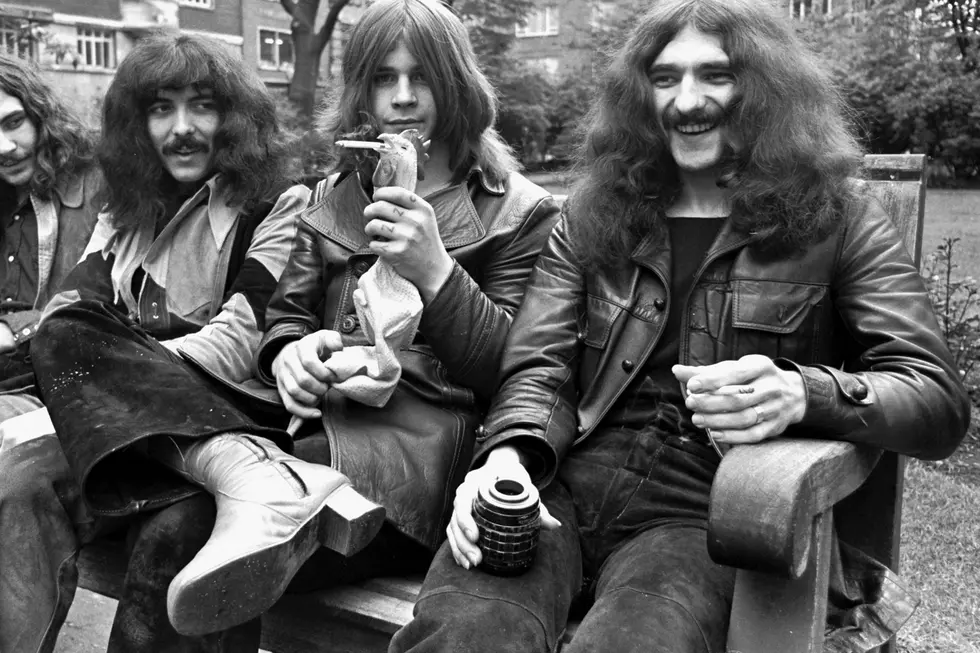
How Black Sabbath’s ‘Dio Years’ Highlighted a Brief but Important Era
Black Sabbath's various reunions with original singer Ozzy Osbourne didn't just resurrect flagging interest in the band. They obscured, seemingly once and for all, their often-overlooked collaborations with Ronnie James Dio.
Black Sabbath: The Dio Years, a compilation album released on April 3, 2007, meant to put things in perspective again. The set featured five songs from 1980's Heaven and Hell, their first album together; four from 1981's follow-up Mob Rules; one from the 1982 concert recording Live Evil; and three from the 1992 reunion album Dehumanizer – along with something unexpected: new songs.
Dio said the label originally asked for unreleased archival recordings to round out this new compilation, but none existed. "We didn’t do any music that we didn’t put on a record when we started," he told Gibson in 2007. "There really wasn’t anything to make this project more interesting. So, they asked us to write two songs for the album, and after a little bit of thought about it, and some getting back together, we decided to do it. We wrote three songs."
Once again, Dio had helped move Black Sabbath out of Osbourne's shadow, putting his own individual stamp on the proceedings by replacing Geezer Butler as the band's chief lyricist. The songs spanned the metal gamut, from the grinding "Shadow of the Wind" to the mid-tempo "The Devil Cried" to the galloping "Ear in the Wall."
"They're the perfect blend, [given] the limitations of only doing three tracks," Dio told MTV. "I feel like we covered all the bases. And the lyrics are pretty weird. Whenever I get back with Sabbath, I seem to have this leash taken off me and I can write as weird as I want to."
Fans weren't the only ones reminded of Dio's small but important role in the Black Sabbath legend; guitarist Tony Iommi was, too.
"I must say that Ronnie has done a fantastic job on the vocals on all of these – he really has – and the lyrical content and the actual melodies are very good," Iommi said in a 2006 interview with Martin Popoff, pointing out how they'd belatedly captured something "very similar to the old Sabbath style of writing."
Listen to Black Sabbath Perform 'Ear in the Wall'
Black Sabbath: The Dio Years told the rest of the band's story, underscoring the importance of a period that had marked the group's final moment of broad musical relevance – up until the 2013 arrival of 13, a long-awaited full-length studio reunion with Osbourne. Iommi worked with a merry-go-round of replacement singers on the Black Sabbath albums that followed Live Evil, and Dio's stint seemed to be wrongly conflated with that creative and commercial slide. A brief reunion for Dehumanizer had been riven by personal differences, too.
Still, the compilation illustrates how Dio was able to lead the band toward a tougher, faster sound than any attempted in its sludgy heyday with Osbourne. They were far more New Wave of British Heavy Metal back then than doom rock.
Even as their sound evolved, the lineup shifted. Original Black Sabbath drummer Bill Ward left in 1980, replaced by Vinny Appice for Mob Rules, Live Evil, Dehumanizer and the new songs. (Appice also appeared on a string of albums under the Dio monicker.)
"The Devil Cried" reached the Top 40 on Billboard's Mainstream Rock charts, and talk inevitably turned to a tour. "We started to work together, and it was really so enjoyable," Dio said in that 2006 interview with MTV. "After long spaces of time not working with people, you forget how good they are or how much you liked being around them."
Old habits die hard, though. They ended up changing the name of the band to Heaven and Hell for the concerts, as well as for a 2009 reunion album called The Devil You Know. The move was apparently in deference, once more, to Black Sabbath's time with Osbourne.
"We'd done a lot of great stuff with Dio, and we thought it would be nice to go out under a Heaven and Hell banner so there’d be no confusion," Iommi told Planet Rock in 2007. "If we’d gone out as Black Sabbath, they’d have expected to hear ‘Paranoid’ and ‘Iron Man.’ There’s nothing wrong with that, but we’d been playing them for 10 years with Ozzy. We last went out with Ronnie and Vinny quite a while ago, and it wasn’t the right time then. But this time certainly is."
Black Sabbath Albums Ranked
More From Ultimate Classic Rock









